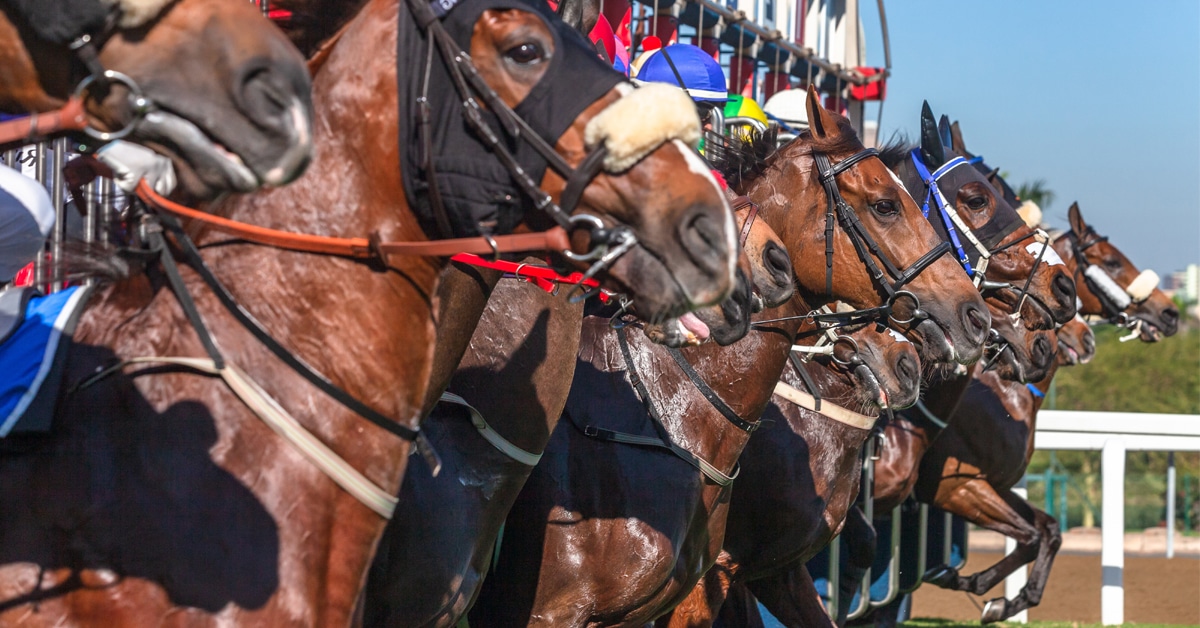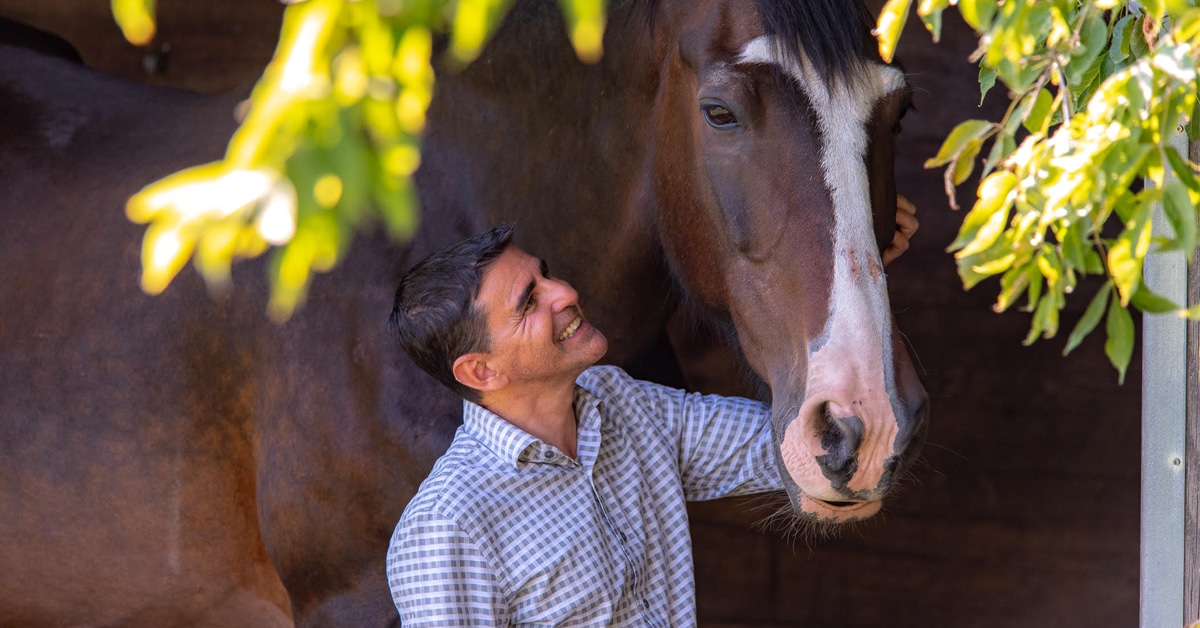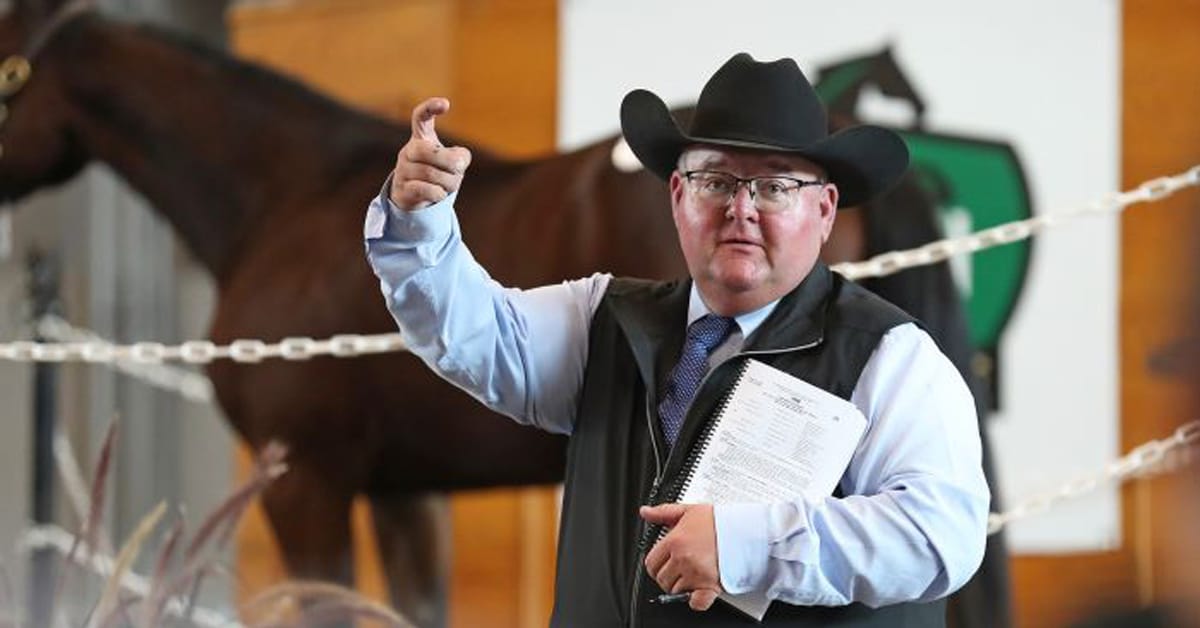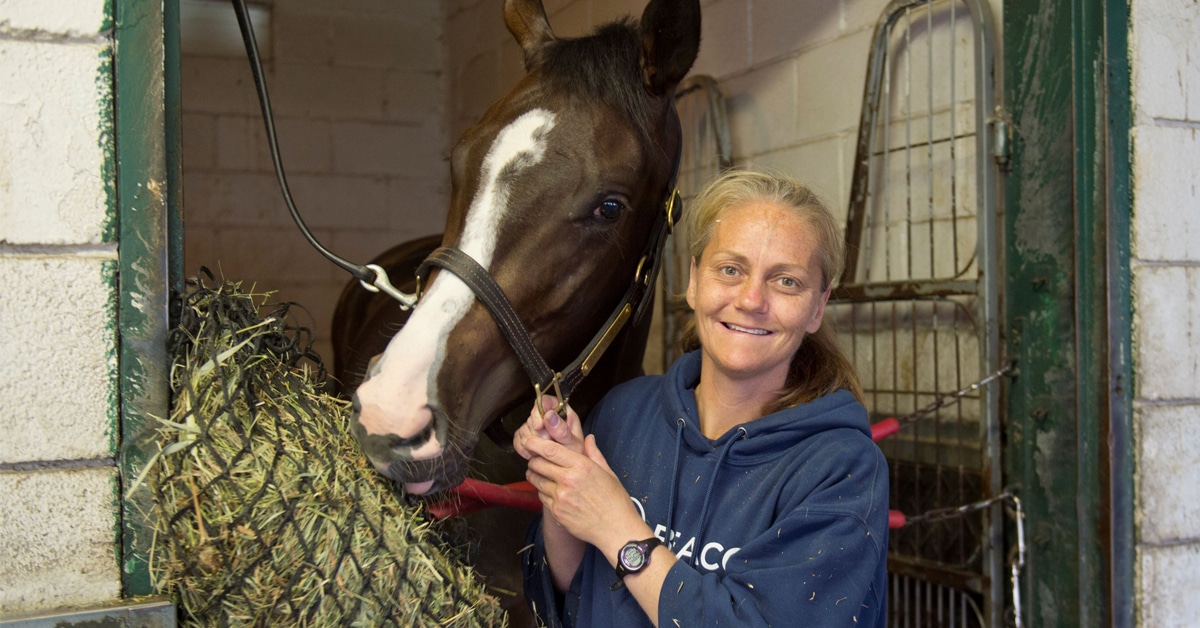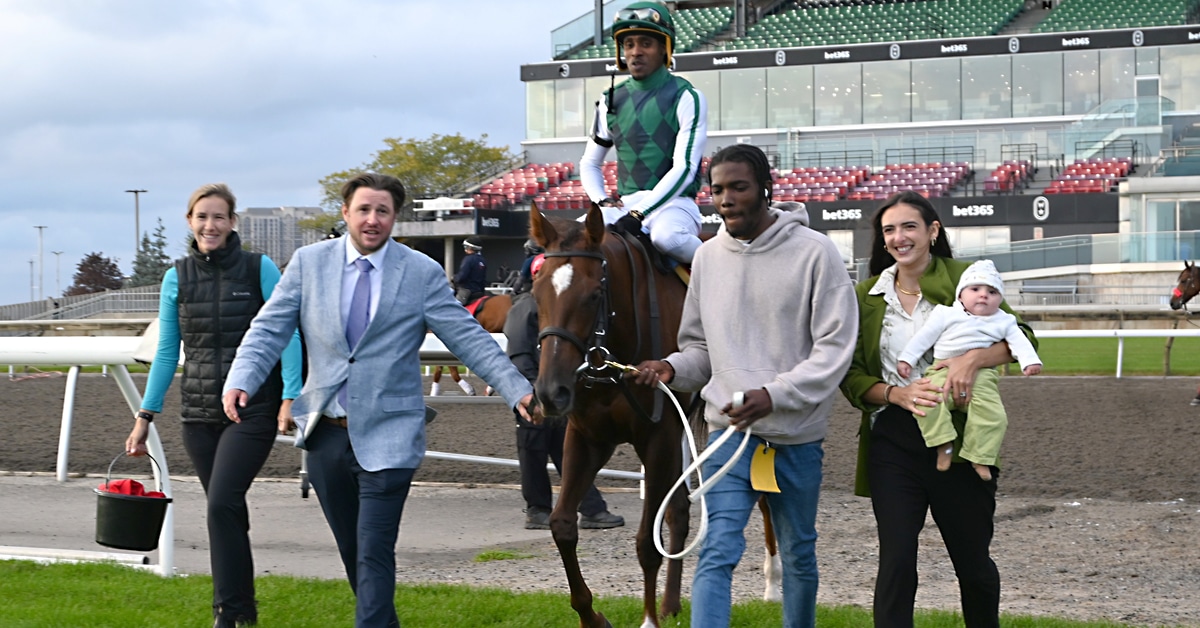Arika Everatt-Meeuse said her true love is raising babies on her family’s farm, like this Afleet Alex—Queen of the Empire filly.
Standing in the middle of a swarm of friendly, curious foals in a field on her family’s Shannondoe Farms near St. Thomas, ON, Arika Everatt-Meeuse is telling the story of how one precocious former foal the farm raised had what one might politely call an oversized personality.
“As she got older, we nicknamed her Satan,” Everatt-Meeuse said, laughing, before turning ominously serious. “We wouldn’t be out here in the field if she was here.
“From her first two, three days of age, she would chase you out of the stall.”
That was nothing compared to the day the young filly — who would turn out to be a racetrack star — decided to pick a fight with Everatt-Meeuse’s golf cart while she was driving through a field of fillies with her young son, Colt, heading to break up a fight between swans on the farm’s large pond.
“I’m driving along in the golf cart and I feel the golf cart bump and I said, ‘What was that?’ I felt it again and I looked behind me and there was the filly grabbing the back of the golf cart. She’s got no ears and she’s grabbing the golf cart as I’m driving. I had a towel with me and I said, ‘Satan, get out of here.’ When I flicked that towel it was game on. All of a sudden her feet came at my son. I screamed, ‘Colt, get on the cart.’ She was attacking us.”
Considering that filly turned out to be Caren — a graded stakes-placed winner of nearly $400,000 that at press time was being aimed toward the Woodbine Oaks — makes those early challenges forgivable.
Caren is not only one of the most talented horses Shannondoe has ever raised, her success helped propel the farm to seventh on the list of all Canadian breeders in 2015 by earnings, with $1,780,288 earned — just behind Spring Farm and ahead of Paul Buttigieg. Caren has also been a catalyst for a Shannondoe-bred and raised 2-year-old selling for $500,000 (U.S.), at the Ocala Breeders’ Sales Company’s March 2-Year-Olds in Training sale this year. That high-priced daughter of Into Mischief is the first foal out of Caren’s sister, Narrate (by Medaglia d’Oro) and was the top-priced filly sold in the opening session of the Ocala sale. Narrate’s foal was purchased in Ocala by Spendthrift Farm of Lexington, KY after Shannondoe originally sold her to Everest Bloodstock for $160,000 (U.S.) at last fall’s Fasig-Tipton October yearling sale.
Both Caren and Narrate are out of Shannondoe’s 22-year-old mare Jo Zak.
“I got Narrate back after she was done running. I bred her to Into Mischief and we sold the filly for $160,000 and then they pinhooked her. I always said she was the absolute favourite filly we’ve ever raised. Just everything about her. She is really a cool filly and just a beautifully put together filly. So, I’m very happy with that mare,” Everatt-Meeuse said.
From apples to trout to thoroughbreds
Shannondoe is a picturesque 60-acre farm located less than 10 kms from the popular Lake Erie beach village of Port Stanley. It is home to about 50 horses, including stallions Society’s Chairman and newcomer Conquest Curlinate.
Originally, it was mainly an apple farm purchased by Everatt-Meeuse’s father, James Everatt when he was 19.
“He just worked away and they started digging a pond. It started out as a trout hatchery. There were two buildings here and they hatched a million trout a year. This was all trout and they’d have people come fishing and they’d deliver fish all over the place,” Everatt-Meeuse said. “My mom’s a nurse and didn’t really enjoy picking dead fish eggs every morning.”
Everatt-Meeuse said her mom, Janeane Everatt, loves horses and in 1971 James paid $3,500 for their first thoroughbred mare. They sold the resulting foal for $7,500 and were hooked.
“I don’t think they made another dime with that mare, but it just grew from there,” said Everatt-Meeuse who had her first pony before she was turned two.
“My parents always said it was the best babysitter $35 ever bought,” Everatt-Meeuse said, laughing. “I rode all the time. I rode all the broodmares. I learned very quickly to check their lips and then I would at least know they were broken. I grew up showing jumpers.”
Everatt-Meeuse said her father built every building on the farm and her mother has been the “driving force” behind Shannondoe.
“Aside from a pretty serious battle against cancer – which she has beaten – in 2013, she has never missed a foaling, either coming to look after my kids while I go to the barn or she comes to help with all the after foaling needs.”
Shannondoe’s 160-acre farm in Paris, KY, named Colton Springs Farm, was purchased about a decade ago.
“I think that program really has changed why we’ve got good two-year-olds. We were always later [raising them in Ontario]. Your horses ship up [from Kentucky] and they’ve got 60 days on anything that stayed here,” Everatt-Meeuse said. “They’ve got bigger feet, they’ve got better x-rays, touch wood — no splints. The little things that you just don’t battle… That has made a big difference as to why I think we’re seeing a lot better results. It’s how we raised them.”
Girl power
Everatt-Meeuse said another secret to the farm’s recent success is the all female equine staff at the St. Thomas location. Everatt-Meeuse’s husband, Tim Meeuse, does the farm’s foaling. Her father and a small crew handles the maintenance, the grass-cutting, the tree-planting — “He’s obsessed with trees,” Everatt-Meeuse said — but in the barn it’s all women, led by Everatt-Meeuse and Ashely Bako and Thomasina Orr.
“I have to say I prefer it now. It’s weird. Women are, in general, more compassionate. They show up, no matter what. I don’t have to go looking for them. They handle the stallions all the time. I’m here with the mares.
“Horses need to be happy. Ulcers are a big thing in our industry. Women don’t try to manhandle them, in general. A lot of guys will come and they just don’t work out here. They’re children. We have weanlings, we have yearlings, they’re going to try you. It’s all new to them.”
Just as the stallion game is new to Conquest Curlinate, who is only four and still learning the tricks.
“He’s a much slower breeder than Society’s Chairman, but he’s learning. He has excellent fertility,” said Everatt-Meeuse, watching the grey joyfully roll around in his dirt paddock before bounding over to say hello.
“I’m hoping in the next month he’ll get out into a normal grass pasture,” she said, referring to Conquest Curlinate’s recovery from a career-ending sesamoid injury last year when he was run into by another horse during training just prior to likely being one of the favourites in the Queen’s Plate.
“When he came to us he was on stall rest. He was practically seven months in a stall. He’s got a lovely disposition. He’s an excellent patient. His first day turned out you would have thought he would be just stupid. He wasn’t. He was a very, very good horse,” Everatt-Meeuse said.
“He’s an extremely personable horse, which I really like about him… You could have him turned out five minutes and you come back to the gate and call him and he comes. He’s a good boy to work with. I’m very fortunate. I’m very happy Conquest and Mark Casse chose us to stand the horse. That was huge.”
Chairman gamble pays off
Society’s Chairman’s first crop hit the track in 2015 and was a big success. He was the leading freshman sire in Canada for stakes winners and by average earnings per runner ($99,972) and was the second ranked freshman sire in Canada in 2015 by total progeny money earned — $699,807 to Court Vision’s $742,286.
It’s impressive results for a stallion that was a bit of a gamble for Everatt-Meeuse. She went to visit trainer Roger Attfield and he showed her five or six stallions prospects looking for homes.
“He brought out Palladio and Musketeer and Not Bourbon and then he brought out Society’s Chairman and I thought, ‘Damn, Roger. Who is that?’ It was, without a doubt the best-looking stallion prospect I had ever seen. I just loved him. I absolutely loved him,” Everatt-Meeuse said. “He said, ‘It’s Society Chairman.’ I said, ‘You can’t work with a horse that didn’t run until he was five.’ He said, ‘Sit down.’ Then he started telling me he was one of the best two-year-olds he ever had. He fractured his pastern the week before he was going to run in August. He got him back the next year and he started working with him… Then he fractured his tibia the year they put the Poly down (at Woodbine). It was the year they switched over… He overcame that and he shipped to Florida in the fall of his four-year-old year and he hadn’t got a start into him. He started him at 65-1 on January the 10th when he was officially a five-year-old. He won by 10-and-three-quarters and went on to be a graded stakes winner, great miler, shipped around. So, now I’m interested. That horse has got heart, he’s sound. He got hurt. He was ready to go as a two-year-old. I came home to mom and dad and said, ‘Just hear me out.’ I had pictures.”
At the time, James and Janeane were more interested another new stallion acquisition, Sand Cove, but agreed to let Everatt-Meeuse try Society’s Chairman. In late, 2011, the two new studs were dispatched to Kentucky to start learning the stallion game. In January, Sand Cove developed laminitis and eventually died after a month battling the disease. His death came around the same time the Ontario government announced it was ending the Slots at Racetracks Program (SARP).
We had 33 mares bought specifically for Society and a bunch of mares for Sand Cove. I sat back down with mom and dad and said, ‘Hear me out. Now we’re in survival mode. We can’t raise a whole bunch of Ontario-sired horses. We may not have a racetrack. We could go broke raising them.’ So, we sold a lot of the mares. We kept the 19 that he has in that first crop of mares.”
Everatt-Meeuse said the success of Society’s Chairman’s first crop led to the addition of Conquest Curlinate.
“With Society’s success, people asked if we wanted another stallion. ‘Look at this one. Look at that one.’ I had 42 stallion prospect pedigrees come across my desk,” she said. “When I heard that (Conquest Curlinate) had gotten hurt, I was at the July Fasig-Tipton Sale and I saw [his trainer] Mark [Casse] there and I said, ‘When we get back home, I don’t know what the plan is but if that horse needs to go to stud, I’d be really interested in him. There was just something about him. I love the sire line. I love Smart Strike. All his sons are making it. I like a horse that is a great broodmare sire and is a great sire of sires. That is important to me… I know he got hurt, but he didn’t break down. He got run into.
“When I talked to Mark, he was not B.S.-ing me. He said, ‘This is one of the best two-year-olds I’ve had. You just watch his races, he was just playing. He hadn’t even figured out what racing was about, yet. He had this incredible turn of foot.’ So, I actually approached them and said I was interested in him and nothing else that had come across my desk… We talked and that was it.”
Just like the arrival of Society’s Chairman to Shannondoe just before the province pulled the plug on SARP, Conquest Curlinate’s arrival in the stud barn turned out to be poorly timed, coming the year changes have been made to the Ontario Sired program. Everatt-Meeuse sighs before talking about it.
“I know there are changes to the Ontario Sired program, but I really do feel that it will settle. People don’t like change. I do see the side of it that Ontario Breds were starting to suffer, because people were getting Ontario Bred horses, they were at Woodbine, the Ontario Sires get to run every week. The races were filling and overflowing and Ontario Breds are sitting on the shelf,” she said. “The guy with Casse is saying, ‘Don’t buy me another Ontario Bred. I’m paying you for three months and this horse is sitting on the shelf. I don’t want one. I can’t run it…’ If you take your Ontaro Bred to Churchill or New York, now it runs for 20 per cent less or 40 per cent less in some cases. It’s bad.”
Can’t beat them, sell them yourself
To try to survive the constant business challenges, Everatt-Meeuse entered into a partnership last fall with Mike Recio, formerly with Taylor Made, on a new agent business called South Point Sales.
“For two years I did Shannondoe Farm in Keeneland and the same mares with $30,000 stud fees were starting in books five or six and always sold on the weekend, with the first couple books for the big consignors. I would, basically, sell a $40,000 horse every year to just give it away to pay a consignor. I said, ‘All right, Mike, we need to do this’ because I hate raising them and prepping them and we put them on a van and I’m calling an agent and I’m saying, ‘This one, if you walk it this way and you do this…’ We’re at crunch time and I’m stressed saying, ‘What if they’re not doing what we did?’ So, now I run sales. I’m at January, February, July. We’re going to Saratoga this year.
“You can’t sell all your product in September and that’s it. One may fall off the bandwagon or something’s wrong… You have to have something for every sale. You’ve got to have some weanlings, you’ve got to have broodmare prospects you’ve got to have in-foal mares, yearlings. You’ve got to have them in July at Saratoga, September, some left for October. You always have other plans and you need the income to keep it going.”
Everatt-Meeuse said she prides herself on breeding for soundness.
“A lot of mares will come right off the track — hard-knocking mares that maybe were good two or three-year-olds and now they’re cheap claimers. They’re six and seven years old, but they’re still running. They still have the heart and they still have the wheels on them. Those are the ones that we will give a chance to,” she said.
“I like to raise babies. I like the commercial end of it. I am not big into the racing. When we get to the sales, I want them gone. We’ve raised them right, now go do your thing.”
It all comes back to this – what Arika Everatt-Meeuse said she loves most about the business is standing in a field of precocious foals and trying to imagine which one might turn out to be a champion.
The Latest

